Since the Russian interference in Ukraine the three Baltic countries started worrying about their security situation. They increased their military budgets. But Russia fights not only with weapons. Russian tv-stations influence the Russian-speaking population, part of which does not yet have Baltic citizenship.The Balts don't panic, says political analyst Andis Kudors from Riga, but count on western security institutions.
by Andis Kudors
Russia’s aggression against Ukraine, Brexit, the election of Donald Trump, the wave of populism throughout Europe make Latvians, Lithuanians and Estonians feel insecure about the future. This uncertainty however should not be perceived as panic. Quite the opposite – looking back to their bitter history the Balts realise that a country has to take care of its future security today.
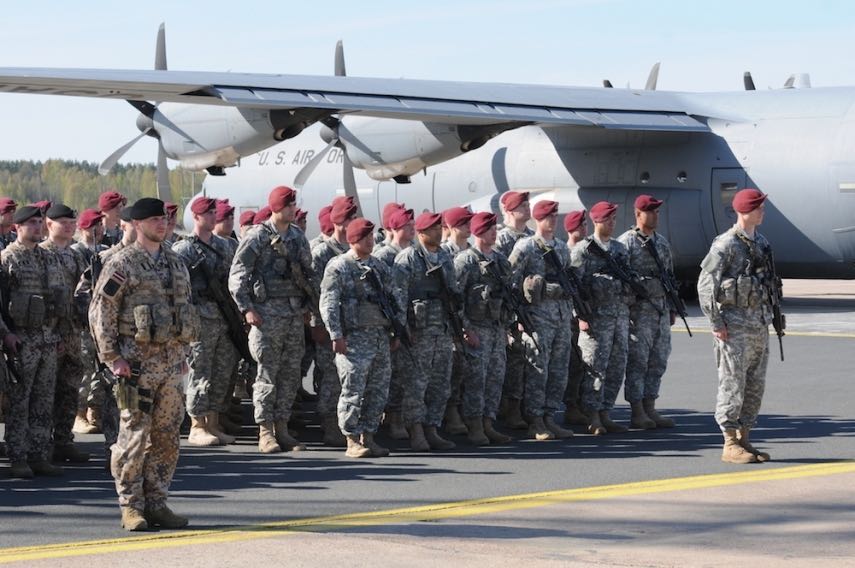 American troops in Latvia. Russians see it as threat, Balts as guarantee agains Ukraine scenario (picture Wikimedia)
American troops in Latvia. Russians see it as threat, Balts as guarantee agains Ukraine scenario (picture Wikimedia)
In 2018 the three Baltic countries will celebrate the centenary of their statehood; Latvians and Lithuanians will join the Estonians and from this year on start spending 2 per cent of their GDP for defence. This time, unlike the period before Soviet occupation in 1940, the Balts will not have to rely on neutrality; all priority vectors in foreign and security policy are directed to the West in general and NATO in particular.
Year after year the NATO Strategic Communications Centre of Excellence based in Riga increases its knowledge and collects experience about the use of propaganda and disinformation against the free world by terrorist and revanchist countries like Russia; the Baltic armies and home guard units are ready to cope with the threats of hybrid warfare. Besides that a NATO military contingent will be deployed in the Baltic states and Poland in 2017. These steps are taken not to engage in war, but to demonstrate to Russia it should not test NATO unity in the Baltics, because the Alliance’s response will be swift.
Despite all these measures our countries are still vulnerable – not all Soviet legacy has been overcome during the democratic transition process. A specific political culture and pro-Moscow sentiments are still present among the sizeable Russian-speaking community who arrived during the Soviet era. They weaken the Baltic states. Security is more than military capacity, it is mainly dependent on public sentiment and perception of the security situation by individuals.
The feeling of ‘eternal transition’
Four years ago one of the leading Latvian social anthropologists Klāvs Sedlenieks in his blog wrote that Latvians constantly feel themselves in a situation of transition. 'Since the beginning of the 20th century the history of Latvia has witnessed rapid changes, often linked with the expectation of even bigger changes in a near future. The transitional situation in Eastern Europe is associated with ideologies, with military coups and other turnovers as well as the geography itself.'
While Western European nations in the 20th century have had similar experiences, the Balts had far less possibilities to decide on their own destiny. The First World War, the Russian revolution of February 1917, followed by the Bolshevik coup d’etat (the ‘Great October Socialist revolution’ according to Soviet historians) opened a window of opportunity to declare the independence of Estonia, Lithuania and Latvia. What followed was democracy, authoritarian rule, Soviet occupation, Nazi occupation, renewed Soviet rule, ending by new independence after the ‘singing revolutions’ at the end of the 80s. All these rapid changes influenced the Balts way of thinking.
The new independence of 1991 opened up many opportunities and raised hopes, but did not provide for full stability and tranquillity. The national currency of Latvia, to give an example, in a relatively short period, changed from Soviet rubles to Latvian rubles to Lats and finally, in 2014, to the Euro.
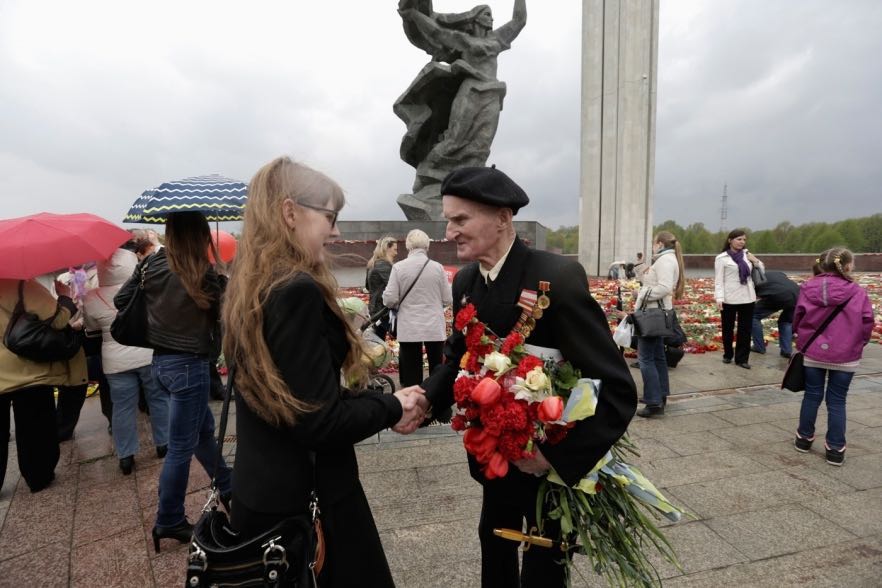 Russians in Riga celebrate Victory Day (9 May); but for Latvians the end of Nazi occupation meant the beginning of Soviet rule (picture Wikimedia)
Russians in Riga celebrate Victory Day (9 May); but for Latvians the end of Nazi occupation meant the beginning of Soviet rule (picture Wikimedia)
The bitter experience of Soviet occupation in 1940 was the key factor for the Baltic governments to strive for membership of NATO and EU as a principal foreign policy priority. When this was achieved in 2004 the air was full of hope and the economies of all three countries started to develop rapidly. Latvia, Lithuania and Estonia were quite successful in implementing the principles of liberal democracy and according to a study by Freedom House Nations in Transit quickly outperformed not only former Soviet republics, but also several Central European countries. In 2004 Latvian president Vaira Vīķe-Freiberga said that Latvia’s admission to NATO provided for unprecedented security guarantees. But ten years later the ‘feeling of transition’ returned.
After the illegal annexation of Crimea by Russia in 2014, a number of British MPs expressed the view that NATO was not ready for the dangers of a possible attack of Russia on members of the Alliance. Edward Lucas, contributor to The Economist, pointed out that Lithuania, Latvia, and Estonia are the front-line states, and a security crisis in the Baltic states is the biggest threat to NATO, therefore the Alliance had to boost its presence in the region to deter Russia.
Since then the situation has improved: US, British, Canadian and German soldiers will be stationed in the Baltic states and Poland in 2017. But we should keep in mind that security is not only a matter of military defence. Effective democratic institutions and an internal political process that cannot be manipulated from abroad is as much a security issue. Unfortunately, authoritarian Russia regularly interferes in the social and political processes in the Baltic countries. Russia's activities do not add to the sense of peace but rather revoke the old feeling of ‘eternal transition’.
Next to fortress ‘Russia’
Geography still matters in international policy. One thing is to speculate from a relative safe position of distance about Vladimir Putin’s ambitions, if the observer lives in Western Europe or the USA. The situation is different if you live in the 'front-line states', where a number of media, controlled by the Kremlin, on a daily basis fight for the hearts and minds of the people. Russia's actions and rhetoric do not allow the Balts to calm down and become careless.
In 2008 the book Fortress Russia was published in a series with editors/authors Mikhail Leontiev and Alexander Nevzorov. In the preface Leontiev writes: 'Why did the post-war USSR meet the USA in a similar situation as the defeated Germany after World War II, but with a undoubtedly much less effective economic system? Because it did not accept a Marshall plan. It did not open up.'
In the same book Mikhail Yuryev, former deputy speaker of the State Duma, states that Russia should not limit its isolation to its own territory, but should include former Soviet republics by using their Russian speaking areas. Yuryev writes that 'it is not so much a matter of creating obstacles to influences from outside, as to changing society itself to make it immune to such influences'.
These quotes point to an essential foreign policy dimension of Russia, that is not only a matter of military defense, but to virtual defense that builds ideological and information walls. The purpose of these media walls is to isolate the population of Russia from the influence of the Western world in order to keep the positions of the Russian elite unchallenged. The problem for the Baltics is that a big part of the Russians living in Latvia and Estonia are also dragged into this fortress of propaganda and disinformation; they are often better informed about Russia than about their countries of residence.
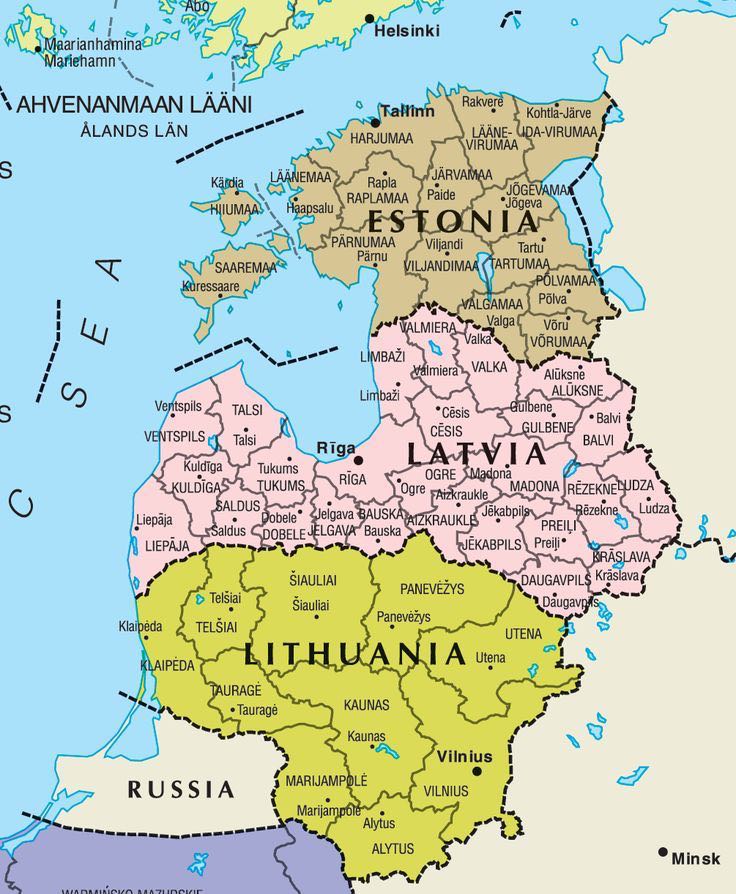 Picture Wikimedia
Picture Wikimedia
But Russia targets not only citizens of the Russian Federation living in the Baltic states, but even more so the ethnic Russians who are citizens of Latvia and Estonia. Russia's policy makers label them as ‘compatriots living abroad’. These ‘compatriots’ participate in general and municipal elections, which means that people who are misled by Russia’s disinformation do influence political processes in Latvia and Estonia
If the TV channel Russia Today is just one of the many English language news channels in in the West, in Latvia alone six or seven RT analogues are operating. These TV channels in Russian are controlled by the Russian authorities and they don't have meaningful competitors or alternatives in the Russian speaking community of the Baltic states. As an example: the annual budget TV channel RTR Rossiya, owned by thye Russian state and enjoying enormous popularity with the Russians of Latvia and Estonia, is bigger than all Latvian TV channels together.
This asymmetry exists also in the military sphere, but whereas Russia respects the borders of the Baltic states which are also the borders of the EU and NATO, there are no borders in information space. Asymmetry in the Baltic and Russian media is visible by the high profile Russian information campaigns in neighbouring countries, while the Baltic media have difficulty even in communication with the ethnic Russians on their own soil, not to speak about addressing the population in Russia itself.
Russia’s 'compatriots policy' with the use of mass media considerably hinder the social integration process within the Baltic states, evoking discontent and concern among Latvians, Lithuanians and Estonians. Therefore, although 25 years have passed since the break-up of the Soviet Union, ethnic Latvians in Riga sometimes feel themselves a minority. This tension inflamed by Moscow does not allow this ‘feeling of transitional uncertainty’ to disappear.
Political influencing
In Latvia there is also considerable political influence from Russia. The Latvian Harmony Party, led by the (ethnic Russian) mayor of Riga Nils Ušakovs, cooperates with Russia's ruling party United Russia. Harmony continued this cooperation after the illegitimate annexation of Crimea. Ušakovs became mayor of Riga in 2009, since the he has been trying to implement his own alternative foreign policy, not in accordance with the policy of the Latvian Foreign Ministry. His primary goal is close cooperation between Riga and Moscow.
In a 2014 interview to the independent Russian TV channel Dozhd he said: 'The best we can have at the moment is Vladimir Putin. Would he be out of the picture, you couldnot imagine someone like Navalny as president'. Ušakovs’ activities are an obstacle to a coherent Latvian foreign policy, that is important not just for Latvia, but for the common EU policy towards Russia.
The popularity of the Harmony Party inside Latvia can be explained by the rift in the political sphere between Latvians and the Russians. These ethnic dividing lines secure a stable support for the party from the local ethnic Russians who tend to ignore the frequent corruption scandals within the institutions and enterprises of Riga municipality. Harmony toes the line to a certain extent, for instance, by cultivating historical narratives, that are propagated by official Russia. This makes the party popular with a large part of the Russian speaking audience.
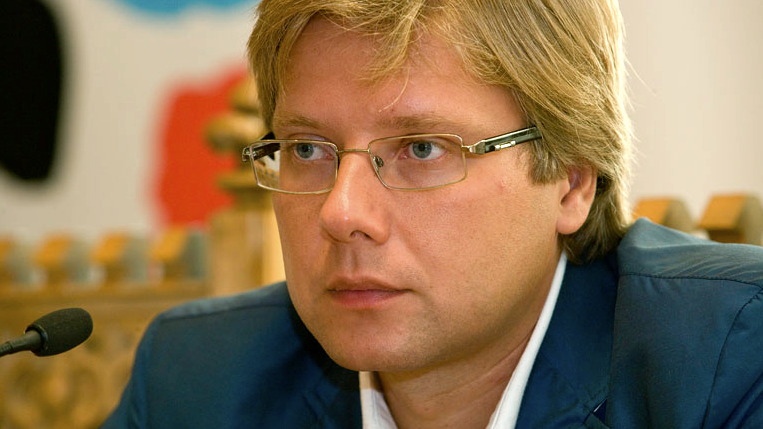 Ethnic Russian Nils Ušakovs is mayor of Riga and leader of the Harmony Center Party in Latvia (picture Wikimedia)
Ethnic Russian Nils Ušakovs is mayor of Riga and leader of the Harmony Center Party in Latvia (picture Wikimedia)
Harmony’s views are partly consistent with the position of Moscow on issues of the rights of Russians living abroad, including the topic of non-citizens in Latvia. When Latvia started the naturalization process in 1995 29 per cent of its inhabitants were former USSR citizens, who had no citizenship at all. Citizens of the USSR who immigrated during the Soviet occupation can become citizens of Latvia through a naturalization process, that demands exams for the Latvian state language and some knowledge of history.
Unfortunately a number of former USSR citizens doesn't want to become Latvian citizens because of lack of incentives. Currently approximately 247,000 inhabitants in Latvia (about 12 per cent of the population) have the status of non-citizens. Citizenship in Latvia has mostly a political significance. Non-citizens cannot participate in elections, but they don't have restrictions on social benefits or economic or job opportunities (with the exception of jobs in state institutions).
Since Latvian independance in 1991 Russia has obstructed a swift process of naturalization by sending the message that it would force the Latvian government to automatically grant the citizenship to all Russians. All citizens of the former USSR should be entitled to Latvian citizenship without exceptions. Latvia’s political elite doesn't agree to that because it would legitimise the Soviet occupation by making Latvia the successor state of the Latvian Socialist Soviet Republic. Notwithstanding this political stand-off the door to Latvian citizenship is open and the naturalization process is simple and relatively swift.
Public opinion
Russia's aggression against Ukraine raised concerns about the security in the Baltic states. Surveys were held to understand the Ukrainian scenario and to poll the overall attitude of the Balts towards NATO, EU, and Russia. Latvia and Estonia experienced the most drastic demographic changes during the Soviet occupation era, when large numbers of Russians, to a lesser extent Ukrainians and Belarussians, immigrated into their countries. The surveys show big differences between ethnic Latvians and Estonians on one side, and the ethnic Russians in the Baltic states on the other.
A few months after the annexation of Crimea the Latvian government ordered a survey of the local Russian population on various issues of internal and foreign policy. The results showed that each fifth person from the Russian speaking minorities in different districts of Latvia would support the country joining Russia or its Eurasian Economic Union. Half of the Russian speakers is negative about NATO and USA and the majority does not support the sanctions against Russia. More than half of the Russian speakers in Latvia have positive sentiments about the USSR and a quarter would vote for its restoration. The majority of the Russian speakers supported Russia in the Ukrainian conflict – only 15 per cent was in favour of Ukraine.
The polls amongst ethnic Latvians show a totally different picture: a large majority is positive about Latvia’s NATO membership and deployment of allied troops in Latvia. In Estonia 58 per cent of the total population see Russia as the main security threat. A survey by the Estonian Ministry of Defence in 2016 showed that while nearly 90 per cent of the country’s Estonian-speaking residents supported the presence of allied forces in Estonia, more than half of its Russian-speaking residents were opposed to it. The presence of foreign troops is supported by 69 percent and opposed by 23 percent of respondents overall, but there is a substantial difference between Estonian and Russian speakers. Of Estonian speakers 88 per cent supported the presence of NATO forces in Estonia, with 7 per cent voting against. But 56 per cent of the Russian speakers are against NATO deployment, as to 29 percent in favour.
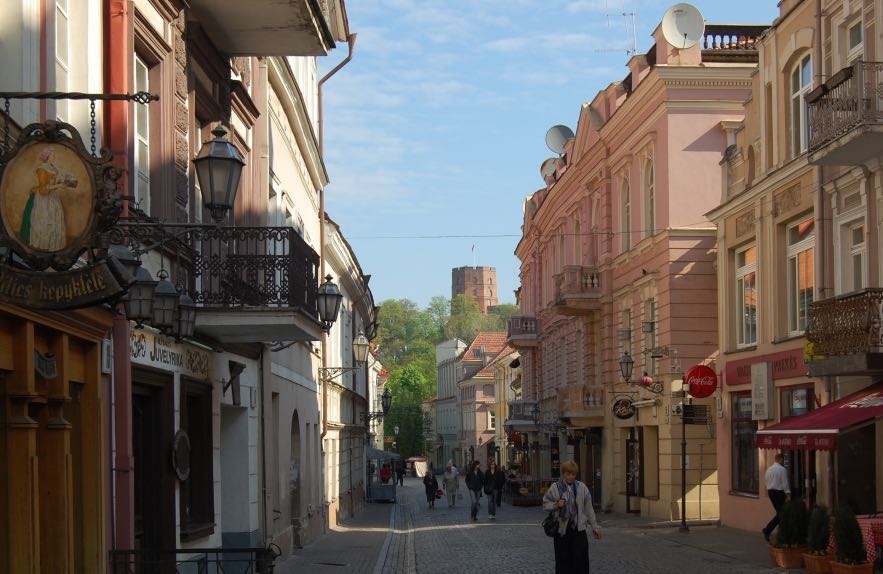 Vilnius, capital of Lithuania, where only 6 per cent of the population is Russian (picture Wikimedia)
Vilnius, capital of Lithuania, where only 6 per cent of the population is Russian (picture Wikimedia)
The ethnic situation of Lithuania considerably differs from that of Latvia and Estonia. Ethnic Lithuanians are 84.2 per cent of the population, with only 6.6 per cent Poles and 5.8 per cent Russians. This gives the Russians a minor role in the social and political life of the country. A survey of the Ministry of National Defence showed a generally positive sentiment about NATO and the rising country’s defence funding. Roughly 81 per cent support or fully support Lithuania’s NATO membership. Only one in ten was opposed. About 82 per cent of Lithuanian citizens favour a permanent deployment of NATO troops in Lithuania, while 13 per cent resist it. 72 per cent of respondents suggest that other NATO member states should deploy more troops and equipment to Lithuania, while 19 rejects this. 46 per cent of Lithuanians see Russia as the major threat.
Keep strong, don't panic
Major support for NATO among ethnic Latvians, Lithuanians and Estonians is logical, because of the aggressive actions of Russia against Georgia and Ukraine. The feeling of insecurity is an obstacle to necessary developments in the country and in people's private lives. But the reassuring messages of NATO officials as well as Western politicians about the importance of the Alliance’s 5th paragraph have strengthened the Balts' feeling of security. The armed forces of the Baltic states have learned from the Ukrainian experience and constantly update their capabilities.
From the nineties on the Baltic states have steadily enhanced their external security by lobbying their Western allies and make preparations for the hosting of NATO troops in case of a threat of Russian intervention. The new US president Donald Trump urged the Balts to raise more funds for the defense sector in order to rely more on their own strength. However, our main concern is not the military threat in the first place, but the weakness of the European Union in defending the principles of international law. Russia has challenged the international community with the annexation of Crimea, accepting the principle that you can deprive neighbouring countries of their territories.
Brexit is also very unfortunate for the Baltic states, because the British have opposed Russia’s revanchism stronger than countries like France or Italy. The wave of populism in Europe where radical forces express sympathy with Putin’s Russia poses a threat for the Baltic states as well, as Riga, Tallinn and Vilnius since 1991 have regarded Western powers as a counterbalance to Moscow’s influence in their region. This counterbalance is vitally important taking into account the asymmetry of the small economic, military and political resources of the three countries in comparison with Russia that never lost its appetite to dominate the region.
Prone to ups and downs in their feeling of ‘eternal transition’, the Baltic front-line states do not panic. It strenghtens them in the belief that the choice to join NATO and EU was absolutely correct. Let's hope that the West will not fall victim to fatalism and apathy, but will firmly stand for its values. It cannot allow revanchist countries to undermine Europe and the United States.
